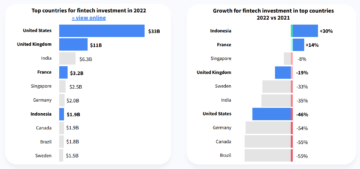In the Asia-Pacific (APAC) region, the economic growth narrative is interwoven with technological innovation, propelling the B2B payments market into new realms of possibility.
With a valuation that leapt from US$478.23 billion in 2022 to a projected US$1.14 trillion by 2031, charting a CAGR of 10.4 percent, this market’s trajectory mirrors the region’s broader aspirations for economic integration and digital transformation.
This burgeoning sector, characterised by its complexity and diversity, demands payment solutions that are efficient and adaptable to the nuanced dynamics of cross-border trade.
Unravelling the complexity of cross-border payments
Cross-border payments serve as vital arteries of international commerce, from traditional bank transfers to cutting-edge blockchain technologies, accommodating a broad spectrum of transaction mechanisms.
These diverse payment modalities symbolise businesses’ dynamic strategies to navigate the varied financial terrains across the Asia-Pacific region.
Amidst the APAC region’s rapid economic ascent and the explosion of digital commerce, cross-border payment practices have noticed an evolution. This evolution is particularly highlighted by the proliferation of e-commerce platforms and the strategic use of social media for marketing, paving new paths for international trade.
The projected expansion of cross-border payments to US$250 trillion by 2027 mirrors the profound changes sweeping through technology, regulatory landscapes, and market dynamics. The shift towards digital wallets, the adoption of open banking, and the worldwide growth of supply chains are testament to this transformation.
Fueling the demand for cross-border payments in the Asia-Pacific region is a melding of pivotal factors: groundbreaking technological advancements like blockchain, distributed ledger technology, and digital wallets have revolutionised the payment sphere, enhancing efficiency and bolstering security.
Simultaneously, the evolution of regulatory frameworks, particularly with the advent of open banking, has nurtured a more interconnected financial ecosystem.
Globalisation has broadened international trade and catalysed the rise of cross-border marketplaces, highlighting the imperative for resilient and adaptable payment systems.
On the consumer front, there’s a growing inclination for payment solutions that are rapid, transparent, and cost-effective, reflecting a broader shift in expectations and preferences in cross-border transactions.
Deciphering the challenges
Yet, the path is strewn with challenges—complexities and costs that can daunt even the most payments-savvy businesses.
The intricacies of managing cross-border transactions, compounded by fluctuating exchange rates and varied regulatory landscapes, call for a nuanced approach to payment solutions.
The digital commerce explosion, fuelled by the proliferation of e-commerce platforms and social media marketing, has redefined the contours of international trade.
This digital renaissance, opening new frontiers for SMEs and influencers alike, underscores the need for payment mechanisms that are not just efficient but are inherently secure and transparent.
Virtual Cards: a gateway to streamlined payments
Recognising the market’s increasing demand for cutting-edge payment solutions, Thredd’s virtual card solutions are redefining the management of international transactions.
The allure of virtual cards in cross-border payments is multifaceted, incorporating aspects such as reduced transaction costs, enhanced security with unique transaction identifiers, the ability to execute payments in real-time, and improved tracking and management of financial activities.
Thredd has recently produced a report on the B2B travel payments industry and included insights as to how virtual cards are solving the challenges facing many businesses in this sector, you can find the full report here.
These attributes collectively contribute to a more efficient, secure, and cost-effective payment experience, positioning virtual cards as an increasingly preferred choice for businesses and consumers.
The appeal of virtual cards extends beyond the basic functionalities of traditional payment methods, offering instant fund transfers crucial for the fast-paced nature of global commerce.
Their inherent cost-effectiveness, through lower transaction fees, presents a compelling case for their adoption over more conventional means. Additionally, the unique numbering system of virtual cards significantly lowers the risk of fraud, providing a safer transaction environment.
This, combined with the flexibility to operate across multiple currencies, facilitates seamless global transactions by allowing purchases to be made internationally while settling payments locally, thus avoiding the complexities of foreign exchange.
Virtual cards simplify the reconciliation process, making it easier for businesses to match transactions with their corresponding invoice line items promptly.
This aspect, along with their ability to enhance liquidity management by providing quicker access to funds, underscores virtual cards’ strategic advantages in managing cash flow and capitalising on market opportunities.
As a leading payments provider, Thredd is committed to fostering speed, security, and transparency in global financial transactions. Thredd’s virtual cards solution is a great example of how digitisation is solving for many of the challenges associated with legacy payments processes.
Virtual card programmes are designed not only for immediate issuance, thereby eliminating the waiting period associated with physical cards, but also for enhanced security by generating unique card numbers for each transaction.
Their flexibility and convenience for online purchases, including support for tokenisation for use at POS and contactless-enabled ATMs, further enhance their usability.
Tackling cross-border transaction challenges
As the path through the cross-border payment landscape is fraught with regulatory, security, and operational challenges, Thredd addresses this head-on, leveraging advanced technology solutions and strategic partnerships to craft customised solutions that cater to the diverse needs of the APAC market.
Thredd’s long-time collaboration with Nium, a leading real-time cross-border payments platform, highlights the role of innovative virtual card solutions in enhancing efficiency and security across many different sectors, including travel.
Working with Thredd and integrating its virtual card technology with Nium’s global payments infrastructure, Nium has been able to significantly speed up transactions to 200 milliseconds per operation.
This allows instant, secure transactions in nearly 30 currencies, improving Nium’s competitive edge and operational flexibility. The collaboration also expands virtual card acceptance by including significant networks like Visa and Mastercard, streamlining financial operations for online travel agencies, hotels, and airlines.
Thredd also supports LianLian Global, a fintech based in Hangzhou focusing on e-commerce, with virtual card technology to enable them to conduct secure and instantaneous supplier payments, navigating the complexities of cross-border transactions.
Moving forward with Thredd
As Thredd navigates the evolving landscape of cross-border payments in APAC, its focus remains steadfast on delivering secure, and efficient payment solutions.
Through the strategic use of virtual cards and a deep understanding of international transaction challenges, Thredd is uniquely positioned to support businesses in the region.
For those aiming to optimise their financial operations with seamless global payments while embracing innovative technologies, Thredd’s solutions represent an important opportunity in the market.
Thredd’s Chief Marketing Officer, Betsy Samuel, will be moderating a panel session titled ‘Travel in China: The Next Big Niche?’ at the upcoming Money 20/20 Asia event in Bangkok, Thailand.
Featured image credit: Edited from Freepik
- SEO Powered Content & PR Distribution. Get Amplified Today.
- PlatoData.Network Vertical Generative Ai. Empower Yourself. Access Here.
- PlatoAiStream. Web3 Intelligence. Knowledge Amplified. Access Here.
- PlatoESG. Carbon, CleanTech, Energy, Environment, Solar, Waste Management. Access Here.
- PlatoHealth. Biotech and Clinical Trials Intelligence. Access Here.
- Source: https://fintechnews.sg/93420/money-20-20-asia-2024/revolutionising-cross-border-payments-in-the-apac-ecosystem/
- :has
- :is
- :not
- $UP
- 1
- 10
- 12
- 14
- 200
- 2022
- 2031
- 23
- 30
- 4
- 7
- a
- ability
- Able
- acceptance
- access
- accommodating
- across
- activities
- Additionally
- addresses
- Adoption
- advanced
- Advanced Technology
- advancements
- advantages
- advent
- agencies
- Aiming
- Airlines
- alike
- Allowing
- allows
- allure
- along
- also
- an
- and
- APAC
- appeal
- approach
- ARE
- AS
- ascent
- asia
- aspect
- aspects
- associated
- At
- ATMs
- attributes
- author
- avoiding
- B2B
- B2B payments
- Bangkok
- Bank
- Banking
- based
- basic
- BE
- been
- begin
- Beyond
- Big
- Billion
- blockchain
- blockchain technologies
- bolstering
- border
- broad
- broader
- burgeoning
- businesses
- but
- by
- CAGR
- call
- CAN
- caps
- card
- Cards
- case
- Cash
- cash flow
- cater
- chains
- challenges
- Changes
- characterised
- charting
- chief
- China
- choice
- collaboration
- collectively
- combined
- Commerce
- committed
- compelling
- competitive
- complexities
- complexity
- compounded
- Conduct
- consumer
- Consumers
- content
- contribute
- convenience
- conventional
- Corresponding
- cost-effective
- Costs
- craft
- credit
- Cross
- cross-border
- cross-border payments
- crucial
- currencies
- customised
- cutting-edge
- cutting-edge blockchain
- deep
- delivering
- Demand
- demands
- designed
- different
- digital
- digital commerce
- Digital Transformation
- digital wallets
- digitisation
- distributed
- Distributed Ledger
- distributed ledger technology
- diverse
- Diversity
- dynamic
- dynamics
- e-commerce
- e-commerce platforms
- each
- easier
- Economic
- Economic growth
- ecosystem
- Edge
- edited
- efficiency
- efficient
- eliminating
- embracing
- enable
- end
- enhance
- enhanced
- enhancing
- Environment
- Even
- evolution
- evolving
- example
- exchange
- execute
- expands
- expansion
- expectations
- experience
- explosion
- extends
- facilitates
- facing
- factors
- fast-paced
- Fees
- financial
- Find
- fintech
- Flexibility
- flow
- Focus
- focusing
- For
- foreign
- foreign exchange
- form
- Forward
- fostering
- frameworks
- fraud
- fraught
- from
- front
- Frontiers
- full
- Full Report
- functionalities
- fund
- funds
- further
- gateway
- generating
- Global
- global financial
- Global Payments
- great
- groundbreaking
- Growing
- Growth
- Hangzhou
- Have
- Highlighted
- highlighting
- highlights
- hotels
- hottest
- How
- HTTPS
- identifiers
- image
- immediate
- imperative
- important
- improved
- improving
- in
- inclination
- included
- Including
- incorporating
- increasing
- increasingly
- industry
- influencers
- Infrastructure
- inherent
- inherently
- Innovation
- innovative
- insights
- instant
- Integrating
- integration
- interconnected
- International
- International Trade
- internationally
- into
- intricacies
- invoice
- issuance
- IT
- items
- ITS
- just
- landscape
- landscapes
- leading
- Ledger
- Legacy
- leveraging
- like
- Line
- Liquidity
- locally
- lower
- lowers
- made
- mailchimp
- Making
- management
- managing
- many
- Market
- market opportunities
- Marketing
- marketplaces
- mastercard
- Match
- McKinsey
- means
- mechanisms
- Media
- methods
- milliseconds
- modalities
- moderating
- Month
- more
- more efficient
- most
- multifaceted
- multiple
- NARRATIVE
- Nature
- Navigate
- navigates
- navigating
- nearly
- Need
- needs
- networks
- New
- news
- next
- niche
- NIUM
- noticed
- nuanced
- numbers
- of
- offering
- Officer
- on
- once
- online
- online purchases
- only
- open
- open banking
- opening
- operate
- operation
- operational
- Operations
- opportunities
- Opportunity
- optimise
- over
- panel
- particularly
- partnerships
- path
- paths
- Paving
- payment
- payment methods
- payment solutions
- Payment Systems
- payments
- payments industry
- per
- percent
- period
- physical
- pivotal
- platform
- Platforms
- plato
- Plato Data Intelligence
- PlatoData
- PoS
- positioned
- positioning
- possibility
- Posts
- practices
- preferences
- preferred
- presents
- process
- processes
- Produced
- profound
- programmes
- projected
- proliferation
- promptly
- propelling
- provider
- providing
- purchases
- quicker
- rapid
- Rates
- real-time
- realms
- recently
- reconciliation
- redefined
- Redefining
- Reduced
- reflecting
- region
- regulatory
- remains
- Renaissance
- report
- represent
- resilient
- revolutionising
- Rise
- Risk
- Role
- safer
- seamless
- sector
- Sectors
- secure
- security
- serve
- session
- settling
- shift
- significant
- significantly
- simplify
- Singapore
- SMEs
- Social
- social media
- solution
- Solutions
- Solving
- Spectrum
- speed
- sphere
- steadfast
- Strategic
- Strategic Partnerships
- strategies
- streamlined
- streamlining
- such
- supplier
- supply
- Supply chains
- support
- support businesses
- Supports
- system
- Systems
- technological
- Technologies
- Technology
- testament
- Thailand
- that
- The
- their
- Them
- thereby
- this
- those
- Through
- Thus
- titled
- to
- tokenisation
- towards
- Tracking
- trade
- traditional
- transaction
- transaction costs
- Transaction Fees
- Transactions
- transfers
- Transformation
- Transparency
- transparent
- travel
- Trillion
- true
- underscores
- understanding
- unique
- uniquely
- upcoming
- usability
- use
- Valuation
- varied
- Virtual
- virtual cards
- visa
- vital
- Waiting
- Wallets
- while
- will
- with
- worldwide
- you
- Your
- zephyrnet













